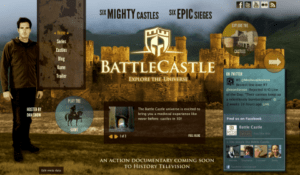Transmedia Reflections
As the transmedia experience is overtaking the entertainment, advertising and non-for-profit world, educators are re-thinking how to guide students in the skills of storytelling.
Recently, I’ve been asked to present my take on the latest media buzzword at several conferences and university panels.
I start by asking my audience, often 40+ folks in leadership positions, what they think is the definition of transmedia. While most people seem to think it is the distribution of content (usually a film) on multiple platforms, one of the most original takes I’ve heard was “media in the age of late capitalism.”
The motivation behind this skepticism might be that transmedia is merely a digital take on good-old merchandising and the Hollywood disease of sequelitis. In other words, squeezing the bejeezus out of what is initially an original idea.
People wiser than I, like Henry Jenkins, have defined transmedia by seven core concepts and have thought and written extensively about it.
In a nutshell, I would define a transmedia project (some call it cross-platform) as telling a single story or story experience across multiple platforms and formats, with two distinctive qualities:
- Disintermediation, a cultural phenomenon which means the absence of a middleman like a broadcaster or distributor. The producers of content are directly connected to consumers, as we see in many other areas of life, like shopping directly from the manufacturer or investing directly in the securities market rather than through a bank or broker.
- Multiplicity means a variety of alternate storylines each adapted to a different platform, such as a television series or movie, a web series, an interactive game, or comic book. You could compare that to spin-off television shows.
Case studies: Battle Castle and Grand Budapest

One example of a transmedia project I worked on with Agentic is Battle Castle, based on a six-part television documentary series about the world’s greatest castles. The transmedia property we created contained an entire universe of medieval castles, weapons and stories. There were motion comics, an app, Flash games, and a book. We also launched Masters of Constantinople, an HTML5 game that allowed people to play as one of six characters immersed in our reconstructed world of the fall of Constantinople in 1453.
A recent impressive example of a transmedia project in the (US) indie film landscape is Grand Budapest Hotel by Wes Anderson. The project is based on a film by the same name, which is in itself inspired by the writings of legendary 20th century Austrian author Stefan Zweig.
The film story deals with a hotel concierge in the fictional European state of Zubrowka. To support the film’s release, the filmmakers created a number of different extensions to the main story, including a fictional film commission for Zubrowka. Word goes Anderson was so impressed by the colour scheme of the Zubrowka website, he colour-corrected the film to reflect this. They even produced an actual perfume in limited qualities for the fans and re-created the world of the Grand Hotel as a live-event in the UK.
Wise words from the peers
Some creators, especially those used to the classic way of making movies, documentaries or social change campaigns, may want to rip out their hair when thinking about alternate platforms and storylines they need to finance and deliver. However, I think there is an opportunity here to reach out to a more diversified audience. As Tracey Friesen, an independent media producer and former NFB executive puts it, “storytelling remains essential, even if the form becomes unique.”Catherine Winckler of Switch United, a company that has worked in interactive media since the 1980s, says transmedia is the most exciting promise in storytelling we have seen in years.
Money is not a dirty word, it’s a necessity
And even when you are scrambling to find a budget for your product, let alone an online universe, there are ways to locate and engage an audience beyond setting up a Twitter account, says Moyra Rodger of Magnify Digital, an agency that created an ALERT¨ system for online digital strategies.
Have questions? Don’t hesitate to contact me for a chat about your organization’s need of getting the message across.
- Author: Phillip Djwa
